'Deeply insulting': Brittany Higgins accused of making up rape claim
Day four of the rape trial against the former political staffer has wrapped up in Canberra.
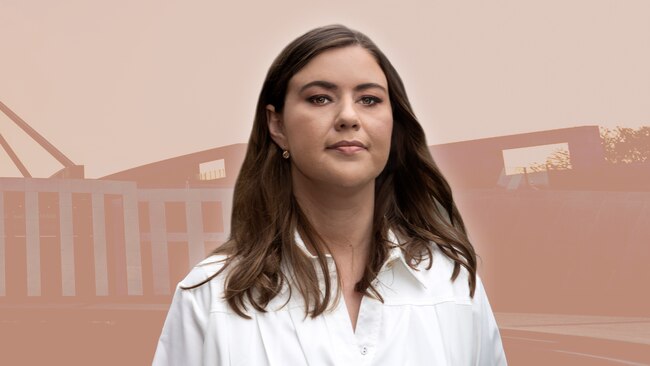
Day four of the rape trial against the former political staffer has wrapped up in Canberra.
The defence in Bruce Lehrmann’s high-profile trial has accused Brittany Higgins of making up her rape claim.
Day four of the trial in the ACT Supreme Court also heard that after going public with her story, Ms Higgins was offered $325,000 to write a book about her experience in a deal brokered by Peter FitzSimons.
During a combative cross-examination on Friday, barrister Steven Whybrow suggested to Ms Higgins that she did not visit a doctor in the days after the alleged rape on March 23, 2019, because it never happened.
“The reason you didn’t go to a doctor is because you hadn’t had sex with anybody on the Friday night, consensual or otherwise,” Mr Whybrow suggested. Ms Higgins said that was “not true”.
She admitted she didn’t tell anyone about the alleged sexual assault before her meeting with Fiona Brown – chief of staff to then defence industry minister Linda Reynolds – on Tuesday, March 26, but said that was because “it took me more than three days to process my rape”.
NEED BACKGROUND? Here's what the case is about.
DIVE DEEPER: Higgins grilled over Lisa Wilkinson recording
Ms Brown flew to Canberra to deal with the security breach after Mr Lehrmann and Ms Higgins entered Senator Reynolds’ office at about 1.40am on March 23 after a night out drinking.
After arriving at Parliament House on March 26, Ms Brown summoned Mr Lehrmann and Ms Higgins into her office for separate meetings. Mr Lehrmann went first. After emerging, he immediately packed up his desk and left.
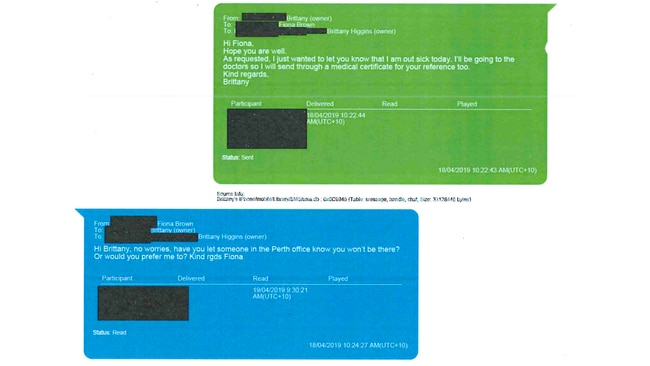
Ms Higgins was then called into the office, where she says she made “full and frank” admissions about the security breach and told Ms Brown that Mr Lehrmann had sexually assaulted her.
“I didn’t use the rape term but I said he was on top of me,” she said. “I said I was barely lucid.”
Mr Whybrow suggested that Ms Higgins fabricated the rape in order to justify the security breach at Parliament House and keep her job after seeing Mr Lehrmann get fired.
“Nothing that you are saying right now is true whatsoever and it’s deeply insulting,” Ms Higgins said. “I completely disagree with everything you’re saying.”
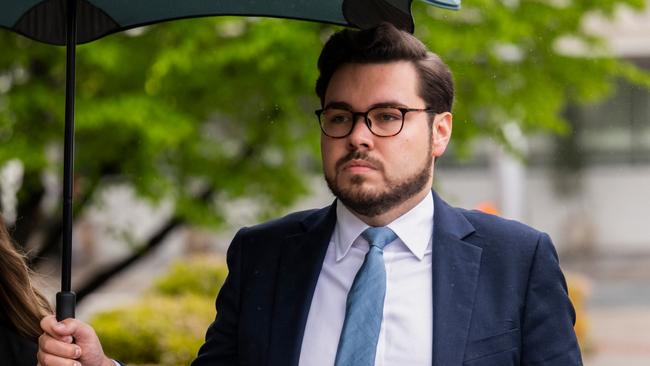
Text exchanges between Ms Higgins and her former boyfriend, Ben Dillaway, which were read to the court, revealed that Ms Higgins told him she had passed out at Parliament House, but didn’t tell him about the alleged assault until after her meeting with Ms Brown three days later.
She also told Mr Dillaway that she had already visited a doctor, which she admitted on Friday was untrue.
“I was placating an ex-boyfriend. I was going to do the right thing,” she said. “I intended to do the right thing, but every time I went home I was collapsing and unable to get out of bed because I was so deeply depressed because I had been assaulted at work by a colleague.”
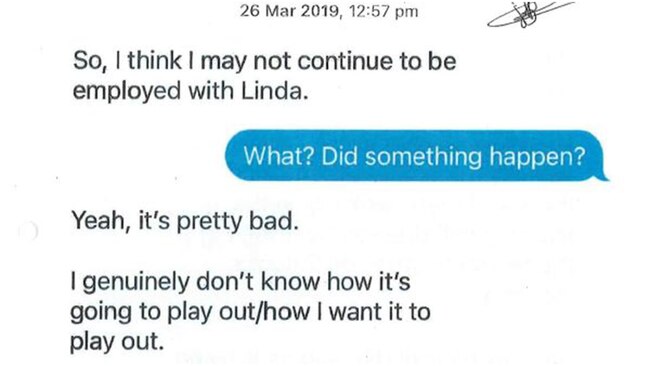
The court also heard that on Thursday, March 28, 2019 – five days after the alleged rape – Ms Higgins asked to take the following day off work to attend a doctor’s appointment.
Mr Whybrow said that in doing so, Ms Higgins was committing a “a deception you played on Ms Brown”.
“You told Fiona Brown you needed to go to the doctor on Friday, I suggest, to bolster your false suggestion that something non-consensual had happened with Mr Lehrmann,” Mr Whybrow said. “At the same time that you were telling her that you were going to go to a doctor tomorrow, you were organising to catch-up and hang out with Mr Dillaway that evening.
“The implication, I understood, was that you effectively were bedbound because you were so depressed and ill that you couldn’t go to a doctor at that point in time.”
Ms Higgins admitted she had caught up with Mr Dillaway on the Thursday evening, after she had gone to a gym, and had breakfast with him the following morning.
“He was consoling me and he was trying to cheer me up as much as humanly possible, but yes, essentially bedbound,” she said.
An angry and combative Ms Higgins broke down crying several times throughout the cross-examination.
“I had intention of going to a doctor,” she said. “Like I’ve said many times, I just couldn’t follow through with it because having those conversations with professionals was so confronting and so difficult.
“Whether it was doctor’s appointments, actually confronting the actual rape itself was really, really hard and Ben (Dillaway) was the only person who I’d told, so he was consoling me.”
She also frequently interrupted Mr Whybrow before he finished asking his questions.
“I suggest that you told Mr Dillaway that you’d already gone to a doctor again to bolster him believing that you had had some non-consensual activity,” he said. “And the reason you didn’t go to see a doctor, either the one that you told Mr Dillaway you had already seen, the ones you told the police you’d already … seen and the one you told Fiona Brown you were going to see … is because you hadn’t had sexual intercourse with Mr Lehrmann on that weekend, consensual or otherwise.”
Ms Higgins said Mr Whybrow was “so incorrect”.
“I don’t know if you’ve ever gone through a trauma before but confronting it head-on with professionals is a really difficult thing to do,” she said.
“I’d slowly started telling my inner circle of friends. It was very, very hard. I was bedbound. He was consoling me. I was doing my best in extremely trying circumstances. I completely reject everything you’re saying.”
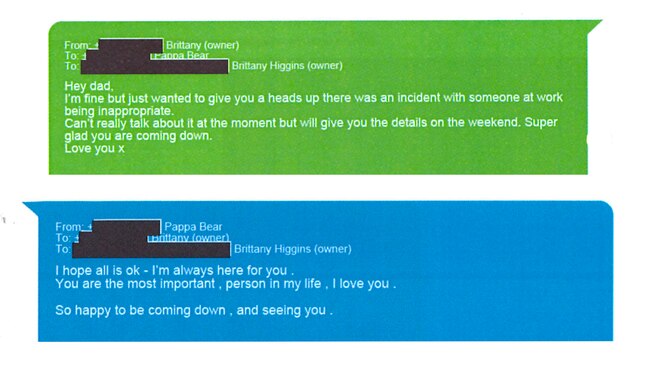
The court has also heard that Ms Higgins first spoke with police about the alleged rape on April 1, 2019, following a meeting with Senator Reynolds and Ms Brown.
Mr Whybrow asked Ms Higgins if she recalled telling the police, who were based at Parliament House, that she had “woke up very confused” in Senator Reynolds’ office and “became aware of (the) smell of sex” and vomit stains on her dress.
Ms Higgins said that sounded “broadly accurate”.
“I don’t remember if I specifically said those words, but I believe those words are in line with what my experience was, so, sure,” she said. “I was on my hands and knees on the minister’s floor and I vomited into her toilet. I’m not sure if it got on my dress or not.”
A federal agent recorded in her notebook that Ms Higgins did not want to progress with a formal complaint.
“I didn’t want them to action anything yet,” she said. “I was pending. I’d just had a very intense conversation with Minister Reynolds and my chief of staff. I wasn’t ready for them to activate anything because I was terrified.”
Mr Whybrow said that Ms Higgins told those police officers that she had attended a medical centre and had tests done after the alleged assault, but that no results had come back yet.
Ms Higgins said she had an intention to do that but did not follow through.
“I just wasn’t capable,” she said. “I’d been raped days before. I was somehow making it into work in the same office that I’d been raped in. I wasn’t capable.”
On April 8, Ms Higgins spoke with dedicated sexual assault detectives at the Belconnen police station. On April 13, she informed those officers via email that after “further consideration” she had decided not to proceed with a complaint for both personal reasons and due to her “work circumstances”.
“I just knew we were having ongoing discussions about where I would be for the election,” she said. “I was getting internal pressure about what that meant and how my career would go, if I chose to go – stay in Canberra or try to go to the Gold Coast.
“I communicated to Fiona that, ‘OK,’ and ‘I’ll go to WA,’ and that was the moment I let it go.”
On April 13 Ms Higgins travelled to Perth where she worked on Senator Reynolds’ election campaign. Following the election Ms Higgins went to work for Michaelia Cash.
Ms Higgins told the court that by the end of 2020 she “had started percolating on this feeling that I had to come forward”.
By mid-January 2021 she had started speaking about her alleged assault with “mostly friends” and seeking advice about “what it would look like for my life” and the possible implications of telling her story publicly.
“I’d started sort of speaking about it with mostly just friends,” she said. “We were talking about, sort of, the prevailing media stories of the time, and I – you know, they rung very true to me because I had lived experience, so particularly around, sort of, like, the (Christian) Porter allegations.
“That really prompted me to start having conversations with friends and family, so people who aren’t known to the press.”
Ms Higgins confirmed she was revealing to people at that time that she had “a lived experience not unlike other things that were being reported from Four Corners”.
She was also considering going public with her own story. “I really hadn’t made like a 100 per cent firm decision. I was still umming and ahing at that point, but David knew that I was really thinking about it seriously.”
On January 27, 2021, Ms Higgins went to Sydney and met with Angus, Lisa and David Sharaz.
On January 29, 2021, Ms Higgins resigned from Senator Cash’s office. On February 2, 2021, Ms Higgins returned to Sydney and sat down for a recorded interview with Lisa Wilkinson.
On February 3, Ms Higgins had a Zoom meeting with Emma Webster, who had worked for the First People’s Assembly in Victoria but was now a PR consultant, to “war game” how to handle the media when the story emerged.
On February 4, 2021, Ms Higgins contacted the detectives she’d spoken to in 2019 via email requesting a copy of her case file and indicating that she wanted to proceed with her complaint.
Ms Higgins told the court she was contacting police to re-engage with them and find out if her “case file still exists”.
“I just wanted to know that, like, there was still an active case file,” she said. “I didn’t really know how police store records so I wasn’t sure if it, like, existed in their system still, or if I have to, like, start the process anew.”
Ms Higgins denied trying to obtain her file so that she could provide it to journalists.
She reiterated that she wanted to tell her story publicly and make a police complaint – “in lock-step with one another”.
On February 15, 2021, her story was published in News Corp publications and broadcast on The Project that evening.
The court heard that after the story broke that morning, Ms Higgins was involved in circulating to journalists a timeline of events she had prepared.
By the time she sat down for a police interview in February 2021, she had already started writing the outline and chapters of a book.
“It wasn’t really a firm thing and there was no prospect of it ever being a real tangible product, but I just felt like I needed to document my experience,” she said.
“And so it was a really strange sort of full-circle moment when that actually sort of became and came to fruition because when I originally started sort of thinking about, you know, writing, there was no prospect.”
The court heard that in mid-March 2021, FitzSimons told Ms Higgins that a publisher was willing to pay $325,000 to publish her story.
“We met at an event and he suggested, ‘You need to write a book’, and said he’d act as my agent, and I said, ‘Whatever, sure’,” she said.
“And then within a day he’d come back with offers, so it was a really quick turnaround, but we’d only met, and on that day we met he immediately said, ‘You need to write a book’.
“I really didn’t ask him. He absolutely approached me and told me to do it and said, ‘I know people. I’m going to talk to them for you’, and I went, ‘OK’.”
The court heard that police repeatedly asked Ms Higgins to provide them with her mobile phone between February and May, 2021, and that before finally handing it over she had “scrubbed” it of “all of the horrible parts of my life”, but denied she was trying to hide anything from the officers.
Ms Higgins said she deleted all the photos of Senator Reynolds because she “never wanted to see her face again” and that a photo of her with the then minister at a Liberal function in Perth was taken down from Instagram.
“My phone is my life,” she said. “I didn’t want to have to scroll through my camera roll every day and see her face.”
Ms Higgins said she deleted a text message she sent to her former boyfriend, Mr Dillaway, on April 9 that read: “I’m not interested in pursuing it, but it’s all beyond strange.”
Ms Higgins sent audio recordings to her current partner David Sharaz on May 21 and when he asked her what they were, she responded: “Old audio. I’m clearing out my phone ahead of the police.”
Ms Higgins told the court she was sending audio recordings to many people at the time because she was terrified of losing them and handing her phone over to police.
The trial resumes on Monday.


